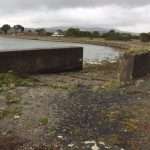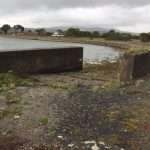No chance of a catch
A stone wall divides the shore from the road which skirts the coastline. No more than a three feet high, it is presumably sufficient to prevent high tides flooding the route, cutting off the small communities that only become visible as one reaches each of the coves. Turning into one of the coves, there is a break in the wall, an opening built into the defence, an access to a slipway, a slip that has not seen a boat for many years.
Looking around, the houses all seem modern, built no more than twenty, or even ten, years ago, were there once fishermen’s cottages along the shore? Did someone’s livelihood once depend upon the use of the long redundant slipway?
Being someone whose livelihood depended upon a small boat would not have been an easy life, but, at the time, it would not have been the worst of lives, there would have been many people along the coast, and in the countryside, and especially in the cities, who were poorer than the person who had his own boat and his own cottage. There would have been times when the prices were low, when fishmongers and merchants paid little for the catch; there would have been times when winter storms made it impossible to contemplate launching a small boat into the unpredictable Irish coastal waters; but there were other times when the catch was plentiful and the demand was good and there would have been half-crowns and shillings to put on the kitchen table at the end of the day.
Such a world, where small boatmen had a chance, is disappearing, the world where the small self-employed trader, whatever his trade, could earn a living is becoming a thing of the past, a world mostly now encountered only in story books.
Of course, we are now infinitely more wealthy than the man who pushed his heavy open boat down the slipway and into the water, we have material wealth he could not have imagined, we have opportunities of travel that would have been no part of the world of the boatman, we have a social mobility unimaginable for the man rowing his boat out into choppy winter waters, but we have lost something, perhaps we have lost many things. We do not enjoy his freedom and independence; with fish from the sea and potatoes and vegetables from the garden behind his cottage, he was dependent upon no-one. We have lost his connection with the seasons, with the climate, with the natural world; who now connects to the Earth with such immediacy? We have lost a chance of experiencing the low points, but also the high points, of a boatman’s life; when the bottom of the boat was covered with silver-scaled herring, or the pots were filled with fine shellfish, then there was an overwhelming sense of it being a good day.
Perhaps a life that is secure and predictable is much preferable, but for the boatman it might feel like a day where the sky is an unbroken grey.



Comments
No chance of a catch — No Comments
HTML tags allowed in your comment: <a href="" title=""> <abbr title=""> <acronym title=""> <b> <blockquote cite=""> <cite> <code> <del datetime=""> <em> <i> <q cite=""> <s> <strike> <strong>